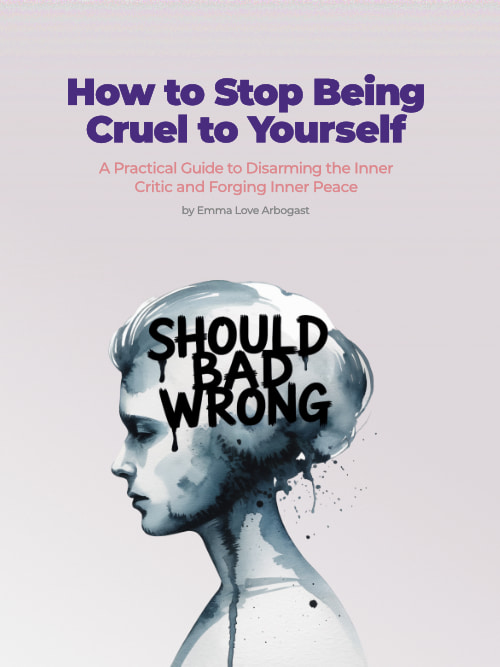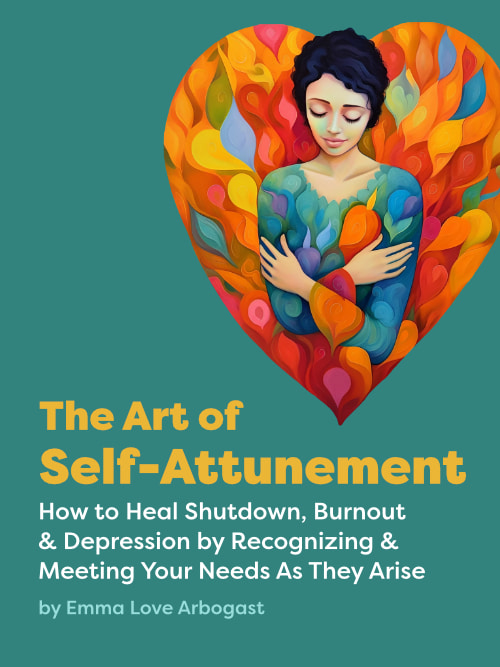How to Decondition Yourself from Capitalist Programming
In this article, I’m going to answer the question:
How do you attain inner freedom & radical joy within an oppressive, alienating culture and system that is built on the use of force rather than just supporting everyone to live dignified lives?
Specifically:
- How do you get your intrinsic motivation back after adapting and conforming to external demands your whole life?
- How do you stop treating yourself like a machine?
- How do you validate and fulfill your needs for rest, play, and creativity?
- How do you stop feeling bad or broken for not living up to various ideals of a “healthy and productive person”?
(Note: by “capitalism”, I mean the entire modern Western materialist capitalist colonialist patriarchal white-supremacist framework. It’s more than just capitalism, but for the sake of brevity, I will refer to it as capitalism in this article. But just know I mean the whole shebang and all the violence inherent in it.)
We all get steeped in a worldview arising from a system of violence, and it shapes how we relate to ourselves.
I didn’t want this garbage in my head, so I have spent a lot of time undoing this conditioning and learning how to treat myself as the awesome human being I inherently am.
That has meant:
- validating my own desires and needs
- accepting my own limits and capacities (with neutrality, not self-judgement)
- cultivating and following my intrinsic motivation on a daily basis
- supporting my own creativity and joy
- not forcing myself to do things
- wanting what I actually want, not what I “should” want
In this article I’m going to explain how I did this.
The key to self-liberation is to realize that all forms of violence are reproduced internally.
Alienation — The same forces that disconnect us from each other also disconnect us from ourselves.
Control — The same violence that capitalism enacts on us, we replicate by expecting ourselves to operate like machines.
Exploitation — The same way that industry extracts resources from the natural world, we package and sell our own time, energy, and creativity as “content”. We present a stylized image of ourselves. We perform our most palatable and relatable parts.
Judgement — The same way we are judged and ranked in school, we compare ourselves to internalized ideals and contort ourselves to fit normative expectations.
Invalidation — As our felt sense of truth and rightness are invalidated, we learn to invalidate ourselves and forget what we know. We become dependent on external sources of validation and legitimacy and knowledge—even knowledge about ourselves.
The antidote is to reverse this internalization by practicing the opposite.
Reconnection — Listen to yourself. Practice attunement, embodiment, presence, self-empathy, self-validation, self-intimacy, self-compassion.
Freedom — Rest when you need to, move at your own pace, ask yourself what you need moment by moment, eliminate “shoulds” and standards. Trust your own process. Recover and follow your intrinsic motivation.
Wholeness — Develop and value all of who you are. Explore your own wildness. Be who you are and want what you want without shame. Become intimate with your strangeness. Relate to your “unrelatable” parts.
Self-appreciation — Recognize your inherent value as a unique being. Love the specific flavor of what you bring to the world. See yourself through the eyes of love and respect.
Self-authority — Affirm, validate, and trust your own feelings, needs, and perceptions. Know what you know, feel what you feel, be who you are.
Much of this is similar to trauma healing and recovery from codependency. But we also need to add an extra layer of deconstruction.
This transition requires a shift in values.
This involves a decision to value your humanity and aliveness over productivity and performance.
The core realization is that the values of capitalism are artificial. They are not naturally occurring—you learned them, and you can unlearn them.
Examples
How to deprogram yourself
- Whenever you notice anxiety, self-criticism, or self-talk that takes the form of pushing yourself, comparison, fault-finding, or self-blame: pause. Write down what you are telling yourself.
- Think about what value your mind is trying to reproduce.
- Ask yourself if you really believe in that as a value, or if is something you have been conditioned to value.
- Identify your actual values.
- Come up with affirmations that assert your real values. (Use ChatGPT if you need help.)
- Take actions in alignment with your real values. (For example: take a break, get some rest.)
The best affirmations are ones where your body relaxes when you say it to yourself. Don’t use affirmations to try to force yourself to change; this should feel like an invitation to remember what you already know. (See Non-Sucky Affirmations for more on this.)
Some example affirmations
- I honor how I feel as I do things, not just what gets done.
- I am not a machine.
- Depth and complexity takes time to develop.
- I trust my own pace.
- I release what is beyond my control.
- Enjoyment is not optional for me.
Now for the deepest level: the foundational lies of modern capitalist culture.
The sinister part is that the internalization of these lies make it feel like it’s your own voice saying it.
These lies are the water we swim in. They colonize our sense of self and create inner worlds ruled by anxiety, comparison, and chronic self-doubt.
The system absolves itself and keeps this all invisible by locating all outcomes (success or failure) inside the individual. That means even these negative feelings feel like something you are doing to yourself, and a sign of your own failure.
But the beautiful reality is, we do have agency in our internal world. We really can rewire our brain. We can see the truth, change our beliefs, undo our conditioning, and treat ourselves with humanity and grace and dignity and love. That is all entirely within our control.
You didn’t choose this—but you can un-choose it.
Nobody sets out to develop these habits of prioritizing productivity over your own needs. We absorb it as we grow up, then we are trained in it at school, and then it is reinforced at work. It is internalized and reproduced by everyone around us—so of course we absorb it too.
Sometimes it can feel like we can’t do anything about it—after all, we still need to get paid.
And that’s true, we all have to survive within this system. But we don’t have to internally agree with the system, or see ourselves through its values. There is a difference between doing something because you need to, and internalizing it as a value that then shapes how you treat yourself.
This is the work of developing internal boundaries and reclaiming authority over what meaning you assign to events. Humans have a remarkable power to change our minds about what things mean. It operates like a muscle or mental habit you can develop—it gets easier the more you do it, and your mind gets more flexible.
Self-love is a set of skills you can learn

Stop Being Cruel to Yourself
$2.99


Hey there! If you're new here, welcome to the Emmaverse! 🌈✨
About me: I'm autistic/ADHD and I write about how to be free and happy from the inside out.
Keep in touch?
Self-Liberation Society
